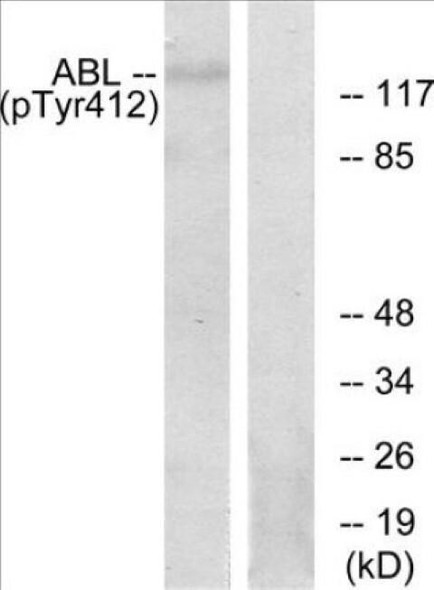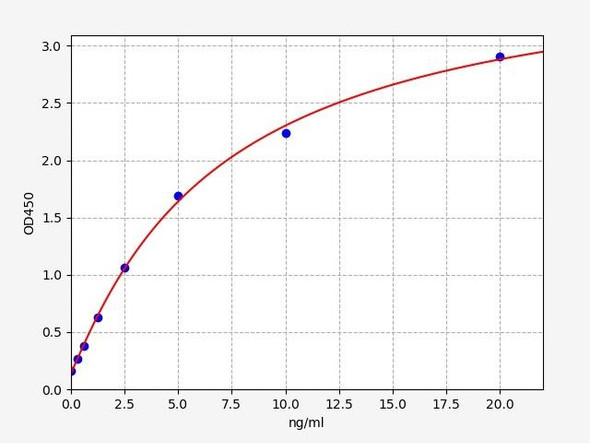Phospho-Abl (Tyr412) In-Cell ELISA
- SKU:
- CBCAB01705
- Product Type:
- ELISA Kit
- ELISA Type:
- Cell Based Phospho Specific
- Research Area:
- Cell Biology
- Reactivity:
- Human
- Mouse
- Rat
- Detection Method:
- Fluorometric
Description
Phospho-Abl (Tyr412) Cell-Based ELISA
| Product Description: | The Phospho-Abl (Tyr412) Colorimetric Cell-Based ELISA allows for qualitative detection of Phospho-Abl(Tyr412) in plated and fixed cells. |
| Target Synonyms: | ABL1; JTK7; Proto-oncogene tyrosine-protein kinase ABL1; c-ABL; p150 |
| Detection Target: | Phospho-IRAK1(Thr209) |
| Reactivity: | H, M |
| Pack Size: | 2 x 96 assays |
| Detection Method: | Colorimetric 450 nm |
| Format: | Cell-Based ELISA/In-Cell ELISA |
| Storage and Stability Guarantee: | 4 °C/6 Months |
| Sample Type: | Plated & fixed cells |
| Range: | 5000 cells/well minimum |
| Time: | 4.5 hours |
Phospho-Abl (Tyr412) Cell-Based ELISA Protein Information
| UniProt Protein Function: | Arg: a cytoplasmic tyrosine kinase of the Abl family. Expressed at the highest levels in mature B cells. Promotes catalase degradation in the oxidative stress response. Localizes to dynamic actin structures and may regulate cytoskeleton remodeling during cell differentiation, cell division and cell adhesion. 4 isoforms of the human protein are produced by alternative splicing. |
| UniProt Protein Details: | Protein type:Kinase, protein; Protein kinase, TK; Protein kinase, tyrosine (non-receptor); EC 2.7.10.2; Oncoprotein; TK group; Abl family Chromosomal Location of Human Ortholog: 1q25.2 Cellular Component: actin cytoskeleton; cytosol; extrinsic to internal side of plasma membrane Molecular Function:actin filament binding; actin monomer binding; magnesium ion binding; manganese ion binding; non-membrane spanning protein tyrosine kinase activity; protein binding; protein kinase activity; protein-tyrosine kinase activity; receptor binding Biological Process: elevation of cytosolic calcium ion concentration; innate immune response; peptidyl-tyrosine phosphorylation; positive regulation of oxidoreductase activity; protein modification process; regulation of autophagy; regulation of cell adhesion; regulation of cell proliferation; regulation of endocytosis; signal transduction; transmembrane receptor protein tyrosine kinase signaling pathway |
| NCBI Summary: | This gene encodes a member of the Abelson family of nonreceptor tyrosine protein kinases. The protein is highly similar to the c-abl oncogene 1 protein, including the tyrosine kinase, SH2 and SH3 domains, and it plays a role in cytoskeletal rearrangements through its C-terminal F-actin- and microtubule-binding sequences. This gene is expressed in both normal and tumor cells, and is involved in translocation with the ets variant 6 gene in leukemia. Multiple alternatively spliced transcript variants encoding different protein isoforms have been found for this gene. [provided by RefSeq, Nov 2009] |
| UniProt Code: | P42684 |
| NCBI GenInfo Identifier: | 1168268 |
| NCBI Gene ID: | 27 |
| NCBI Accession: | P42684.1 |
| UniProt Secondary Accession: | P42684,Q5T0X6, Q5W0C5, Q6NZY6, Q7Z301, A0M8X0, B7UEF2 B7UEF3, B7UEF4, B7UEF5, |
| UniProt Related Accession: | P42684 |
| Molecular Weight: | 60,864 Da |
| NCBI Full Name: | Abelson tyrosine-protein kinase 2 |
| NCBI Synonym Full Names: | ABL proto-oncogene 2, non-receptor tyrosine kinase |
| NCBI Official Symbol: | ABL2 |
| NCBI Official Synonym Symbols: | ARG; ABLL |
| NCBI Protein Information: | Abelson tyrosine-protein kinase 2 |
| UniProt Protein Name: | Abelson tyrosine-protein kinase 2 |
| UniProt Synonym Protein Names: | Abelson murine leukemia viral oncogene homolog 2; Abelson-related gene protein; Tyrosine-protein kinase ARG |
| Protein Family: | Abelson tyrosine-protein kinase |
| UniProt Gene Name: | ABL2 |
| UniProt Entry Name: | ABL2_HUMAN |






